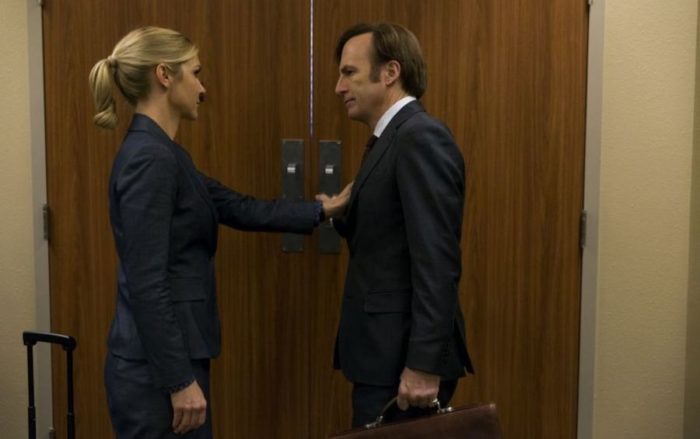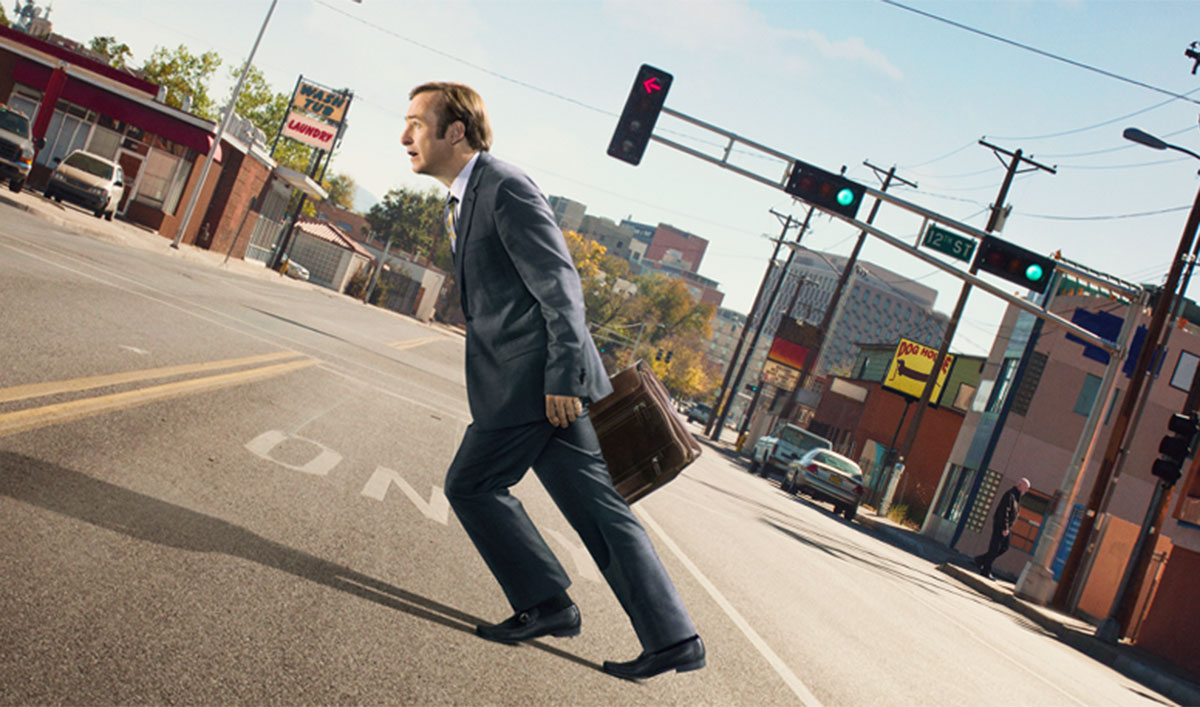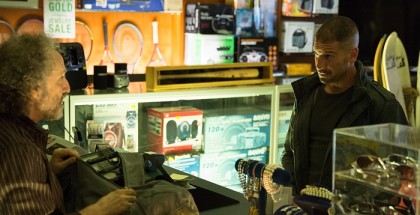Better Call Saul: The tragedy of knowing what’s coming
David Farnor | On 18, Apr 2022
Season 6 of Better Call Saul premieres on Netflix UK on Tuesday 19th April. Read our reviews of previous Better Call Saul episodes here.
Spoilers. When enjoying any kind of story, they’re the thing to avoid at any cost – well, most of the time. Knowing what’s going to happen to a character or situation in advance can sap a story of its dramatic tension, killing suspense or making any emotional investment redundant. It’s one of the reasons why attempts to go back and tell specific stories in franchises such as Star Wars, Marvel and X-Men aren’t alway successful; when we know that a character is going to make it out alive to appear in a future adventure, any sense of personal stakes can go out the window.
All this only makes the success of Better Call Saul all the more remarkable. The prequel to AMC’s Breaking Bad, itself a TV juggernaut, centres in on Saul Goodman, the sleazy lawyer who turns out to be a lifeline for Walter White (Bryan Cranston) and Jesse Pinkman (Aaron Paul), the high-school-teacher-turned-meth-cook and his former-pupil-turned-sidekick. From his loud suits to his shrewd nose for legal loopholes, Saul is the guy who knows what to do when bad things hit the fan. If you’re a criminal in trouble, you better call him.
It’s been almost exactly 13 years since Walt and Jesse first met Saul in Season 2 of Breaking Bad, and he immediately caught audience’s attention as a colourful, eccentric supporting character, played with wit and hint of desperation by Bob Odenkirk. Odenkirk was so good that he went from a bit-part to a central figure in the Breaking Bad narrative, becoming a cornerstone of the criminal underbelly gradually consuming Walt and Jesse. Since then, we have seen him do all manner of questionable things, from the dubious to the despicable – in the final season of Breaking Bad, he suggests killing everyone from Walt’s brother, Hank (Dean Norris), to Jesse, and it becomes clear that he knew about the use of Chekhov’s Ricin earlier in the show. He’s not just caught up in bad situations; he’s someone who helps instigate them in the first place.
At the end of Breaking Bad, we understand that he will go into hiding under a new identity – Gene Takavic – and get a job working at a Cinnabon in Omaha, Nebraska. Better Call Saul gives us a glimpse of that endpoint, with every season opening with flashforwards to his mundane existence as Gene, as he attempts to avoid anyone recognising him. The fact that they are all presented in black-and-white only reinforces the idea that he isn’t heading towards a happy ending – his is a low-key, downbeat denouement, living in between the shades-of-grey consequences of his actions.
Knowing all this, a prequel sounds like a terrible idea, but Vince Gilligan and Peter Gould’s Better Call Saul leans into that knowledge and turns it to the show’s advantage. Slowing things to a snail’s crawl, they turn what could have been a predictable romp through Breaking Bad’s deleted scenes into a study of minutiae, capturing every tiny moral compromise that paves the way for Jimmy McGill (Odenkirk), a well-meaning lawyer in Albuquerque, to become the Saul Goodman we know and love.
When we first meet him, he’s a public defender who wants to do the right thing, but has a past as a scam artist that means he’s wired, on some level, to find the wrong way out of a situation, even for the right reasons. “It’s showtime!” he says to himself in the mirror, as he prepares to go into the courtroom – there is already, to some degree, a sense of showmanship and putting on a front that’s baked in to his understanding of the legal system.
Over the course of the first two seasons, we learn that he’s partly driven by frustration and jealously towards his brother, the respected Chuck McGill (Michael McKean), and bitterness towards Howard Hamlin (Patrick Fabian), the arrogant partner of Chuck in their firm of Hamlin, Hamlin & McGill. Working there is also Kim Wexler (Rhea Seehorn), who has history with Jimmy and a strong moral compass.
The pair’s attraction to each other sets in motion the tightrope walk of Jimmy’s journey, which teeters from doing the right thing and working with Kim professionally to getting caught up with shady deals and dodgy types in order to make it as his own man. The latter lead him to cross paths with former police officer Mike Ehrmantraut (Jonathan Banks) and the pair soon find themselves entrenched in the business of the Juarez drug cartel, along with kind-hearted go-between Nacho (Michael Mando) and ruthless would-be kingpin Gus Fring (Giancarlo Esposito).
With Gus and Mike also reprising their roles from Breaking Bad, there’s a constant reminder of the world Saul is venturing into – offset by the fact that we also know that Nacho and Kim don’t appear in Breaking Bad at all. With Seehorn given more and more screentime to build out Kim’s complex character – a deadpan, stoic presence who also has a knack for controlling her own image – Gilligan and Gould craft an impeccable tale of two people going in the same direction, while also headed for opposite fates. The more time we spend with Kim, and the more time she spends with Jimmy, the more her rigid ponytail loosens up and she takes on elements of his character, sticking up for him to criminals, leaning into plans to wreak revenge and standing by him without regrets. (The fact that she still dreams of opening a law firm to help people who can’t afford legal representation is a key remaining difference between them.)
Both Seehorn and Odenkirk expertly essay the slow drip away of guilt and compassion from their characters, making the strengthening union of Kim and Saul a sad defeat for both rather than a triumphant display of love and resilience. Because we soon learn that compassion is not a useful thing in the Vince Gilliganverse. If Breaking Bad was the tragic story of a good man who, even when given ways out of his situation halfway through his journey, kept choosing the wrong path, Breaking Bad is the tragic story of a man who, despite trying to the right thing, never catches a break.
No matter what happens in Better Call Saul, we know that Jimmy has no choice but to end up transforming into Saul Goodman. What’s heartbreakingly brilliant about his inevitable character arc is that, as we enter the final season, he knows it as well.
Better Call Saul: A pre-finale recap
Warning: This contains spoilers for the end of Season 5.
Lalo and Gus
Gus and Lalo Salamanca’s drug war reached a violent climax at the end of Season 5, with Gus sending a group of armed soldiers to take out the cartel’s key player – only for Lalo to improvise and out-violence the lot of them, leaving him to sneak away into the night and seek revenge, while holding the element of surprise over Gus.
Nacho and Don
Poor old Nacho Varge, whose fate as a pawn caught between Lalo and Gus’ warring isn’t looking good – especially because he was the only one who could have let Gus’ killers into Lalo’s complex. Except a conversation with cartel boss Don Eladio may well have given him a way out, after he pitched himself as the guy to take over the business in New Mexico – will that be enough to give him any protection from the retribution that’s sure to come?
Howard
Has there been anyone more fun to watch over the past five seasons than Patrick Fabian’s perfectly pitched Howard Hamlin? Proud to a fault – unlike Jimmy, who has no pride to get in his way – his patronising attitude towards both Kim and Jimmy has left him the target of their plot for revenge. Kim suggested that they should frame Howard, leaving them able to claim roughly $2 million from the Sandpiper lawsuit that has dragged on for a long time. Expect his downfall imminently.
Mike
Season 5 saw Jimmy attempt to traffic $7 million cash from Mexico to Albuquerque on behalf of Lalo, as bail money – which then led him to cross paths once again with Mike, and Mike’s sniper rifle (which saved Jimmy’s life). Working with Mike, he dragged the money through the desert under cover of darkness, with Jimmy pretending that he had car troubles to Lalo. As for Mike, he’s still in the good books of Gus, although he still hasn’t recovered from having to shoot Werner Ziegler (Rainer Bock), everyone’s favourite lab engineer, under Gus’ orders. Expect him to have a key role to play in the transition between Better Call Saul and Breaking Bad.
Jimmy and Saul (and Gene)
Season 5 opened with Gene being confronted by someone who seemed to recognise him, which suggests that it’s only a matter of time until the past personas of Jimmy will catch up with him, just as we watch him fully embrace Saul as his new identity pre-Breaking Bad. Will we get a whole episode following Gene in Nebraska as he goes on the run again?



















